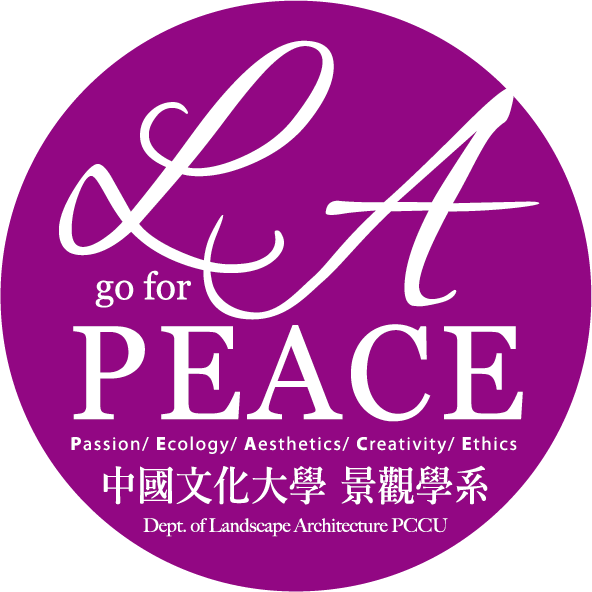

系所簡介
景觀學系(Department of Landscape Architecture + Environmental Planning)於民國七十年奉教育部核定成立,創系原名「造園暨景觀學系」,設於農學院下,為國內大學部中第一個創立推動景觀建築教育與培育景觀專業人才之科系,近年為符合世界景觀發展潮流,確立專業角色定位及配合專業實務需求,遂於民國八十三年正式更名為「景觀學系」,並與建築系、市政系共同設置「環境設計學院」,並於民國九十三年受僑委會補助成立海外青年技術訓練班「景觀暨室內設計科」,以拓展國際交流暨海外服務。民國一百一十三年,在跨域整合的趨勢下,「環境設計學院」與 「農業與生 物資源學院」整併,共同成立「環境規劃暨生物資源學院」,增進科系之間的跨域整合。
民國一百一十四年,本系通過國際景觀建築師協會 International Federation of Landscape Architects (IFLA) 認證,為全台灣第一個,全亞太地區唯二個取得 IFLA 認證的學系。IFLA為全球各國景觀建築師協會所組成的國際組織,囊擴非洲、美洲、歐洲、亞太、中東五大區 80 個國家的景觀建築師協會為會員。IFLA教育委員會在審查各校景觀學位課程後,於全球頒發兩種證書,比較初階的為承認 Recognition,比較高階的為認證 Accreditation。ILFA 的認證過程中,評鑑了本系的課程內容與教學成果,本系教學表現優異,成為全球景觀專業教育國際認證的學系。
創系迄今共招生45屆,在創系主任吳梓博士、歷任系主任及現任張琪如主任之努力耕耘下,業已培育近二千名畢業生,分布在國內外學術單位、公部門各機關及專業事務所中,系務在所有師生及系友共同努力下蒸蒸日上,並累積優異學術與專業名聲。本系係國內歷史最悠久的景觀系,在學術與專業實務上亦當仁不讓負起跨校系師生與國外相關系所交流之責任,其內容包括常態性之學術論壇、研討會、畢業聯展,專業訪問與兩岸交流等。總體發展以多元與國際化為中程目標。
The Department of Landscape Architecture + Environmental Planning, originally “The Department of Landscape and Gardening”, was established by permission from the Ministry of Education in 1981. It was then a part of the College of Agriculture and was the first undergraduate program in Taiwan that provided higher education in landscape architecture. To promote professional education in landscape planning and design, the department was renamed Department of Landscape Architecture in 1994, and in collaboration with the Department of Urban Planning and Department of Architecture, formed the College of Environmental Design in 1995. In 2017, with the Department of Urban Planning’s shift to adopt development management as a core mission, our department was renamed the Department of Landscape Architecture + Environmental Planning. In 2024, in response to the need for interdisciplinary collaboration, the College of Environmental Design merged with the College of Agriculture and Biological Resources to form the College of Environmental Planning and Biological Resources.
In 2025 the department achieved accreditation from the International Federation of Landscape Architects (IFLA), making it the first in Taiwan and one of only two programs in the Asia-Pacific region to receive IFLA certification. IFLA is an international organization comprising landscape architecture associations from countries worldwide, encompassing 80 member associations across five regions: Africa, the Americas, Europe, Asia-Pacific, and the Middle East. Following a review of landscape degree programs at various institutions, the IFLA Education Committee issues two types of certificates globally: Recognition for a more basic level and Accreditation at a higher level. During the IFLA accreditation process, the department's curriculum, teaching conditions, and teaching outcomes were evaluated. The department's outstanding teaching performance was awarded IFLA accreditation, marking its excellence as a landscape professional education program.
系所特色
景觀建築為一整合性專業,本系之教學宗旨在探討人與環境、生態以及景觀資源間之互動關係,並訓練學生理解空間環境之問題、限制以及最適發展之機會與潛力,故目標係建立在人類長遠福祉以及整體生態平衡之考量基礎上,期以實務能力整合景觀生態研究為教學重點及特色,未來可提供大學至研究所的專業進修管道外,並將以學術團隊力量謀求對國家實質環境改善的最大貢獻。
因此本系之教學特色及教育目標在培養景觀專業之人才,其重點為:
一、綜合自然資源、生態環境與景觀規劃、設計之專門學識與技術,使成為一系統化之教學。
二、加強人文與自然資源分析調查規劃之深度與廣度。
三、擴展本系與相關學系間知識之互動與交流,並奠定解決環境周圍之實力與相關專業溝通整合之能力。

1. Our main goals are as follows:
(1) By the integration of natural resources, ecological environment and landscape planning, we design specialized courses and techniques and make it a systematic science.
(2) Enhance the analysis and research of human and science resources as well as the profoundness and scope of planning.
(3) Extend the cooperation and academic exchange of our department and other relative departments, lay the foundation of the ability of solving environment problems and other communicative, integrative capability.
The word “landscape” is a specialized term, which widely applies to science human and art field. It has the responsibilities of overall planning, research, evaluation, design, construct, supervise, manage and maintain. Its professional development has worked for over a hundred years, but it is still a newly risen business in Taiwan. Thus, our goal is to develop landscape specialists to meet the needs of social trends, improve the present quality of the environment in Taiwan and solve various substantial problems in Taiwan.
2. “Landscape” is a professional domain that combines academic and practical
training. Thus, we have the following features:
(1) Foster diversified, specialized education
Landscape architecture is a newly risen domain whose teaching missions focus on the inter-relation of human and the environment, ecology, and landscape resources. Also we want to make students understand the limit of the space, environment, and the give them training so they can have the ability and potential to make the best planning. Therefore, the final goal lies in the consideration of the eternal good of all mankind and balance of the ecology. Relevant courses three fields include environmental science, environmental art, humanities.(ecology, soil, geology, hydrology, animals, plants, behavior studies, aesthetics, the history of landscape…ect.) Courses training which base on these studies comprise core classes such as environment planning, landscape design, landscape engineering, horticulture design, green planning and landscape practice…ect.
(2) Enhance the culture of landscape education
Landscape architecture is a profession that applies the theory of science, art to the research, planning, design and management of natural or artificial environment. The creators who are in this profession—the architecture designers, must put their originality and skills in use, also add other scientific, cultural, and policy knowledge to handle natural and artificial elements of the environment, and arrange them orderly. The outcome must make all the users feel useful, beautiful, safe, and provide pleasant, joyful atmosphere.
(3) Cultivate the knowledge and techniques of professional landscape practice
In order to attain the goals of landscape conservation, moderate development , proper beautify and intensify, the professional landscape architecture practice include:
a. Investigate, choose and confirm the viability and the proper use of environment resources.
b. Regulate, study, design the standards of construction.
c. Make the outline plans for evaluation, analysis for the land development.
d. Study the overall base plans, soil preparation of the landscape engineering and the drainage system.
e. Coordinate the construction of roads, bridges and civil engineers. Under the principles of balance of beauty and function, make these land engineering meet the needs.
f. Coordinate and enforce land development, use project.
g. Undertake the supervision, ratification of the construction, conservation or management maintain of the base.
(4) Expand the scale of environment design, and give students training of overall thinking ability. In terms of the nature of landscape profession, its space order has a wide range:
a. garden, community, park and green
b. interior design
c. open space system
d. urban landscape, urban space
e. the environment design, evaluation of recreational area, scenic spot, a wide field, natural resources, and regional land….ect.
(5) Implement professional landscape ethics and vocational education:
Landscape profession is an integrated service industry. It involves the cooperation and coordination between different professions, and it is closely relevant to public engineering, environment construction. Future courses will put its emphasis on the ethics and vocational moral education as well as elevate students' landscape ideology and their cognition of responsibility of the society.